Agir is a political party in Brazil, established in 1985. It was founded as the Youth Party, and was renamed the National Reconstruction Party in 1989, and the Christian Labor Party in 2000. The party was renamed Agir in 2021, a change ratified by the Superior Electoral Court the following year.
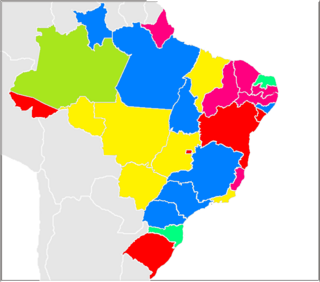
The 2010 Brazilian gubernatorial elections were held on Sunday, October 3, as part of the country's general election. In these elections, all 26 Brazilian states and the Federal District governorships were up for election. When none of the candidates received more than a half of the valid votes in a given state, a run-off was held on October 24, 2010 between the two candidates with the most votes. According to the Federal Constitution, Governors are elected directly to a four-year term, with a limit of two terms. Eleven governors were prohibited from seeking re-election.

The Brazilian Labour Party was a political party in Brazil registered in 1981 by Ivete Vargas, niece of President Getúlio Vargas. It claimed the legacy of the historical PTB, although many historians reject this because the early version of PTB was a center-left party with wide support in the working class. It was the seventh largest political party in Brazil with more than a million affiliated as of 2022.

The Sustainability Network is an environmentalist Brazilian political party founded in 2013 by Marina Silva, a Brazilian politician from Acre. The party formed a strategic alliance with the Brazilian Socialist Party for the 2014 Brazilian general election, until its registration as an independent political party was approved in 2015. The Sustainability Network has 19,090 members as of January 2017.

Gladson de Lima Cameli is a Brazilian politician and engineer. He had represented Acre in the Federal Senate from 2015 to 2019. Cameli is the incumbent Governor of Acre since 2019. Previously, he was a deputy from Acre from 2007 to 2015. He is a member of Progressistas (PP). He has been implicated in the Petrobras scandal.
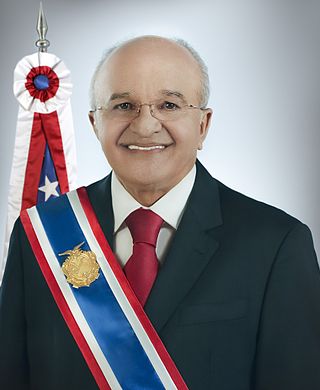
José Melo de Oliveira is a Brazilian politician and was governor of state of Amazonas, Brazil.

Solidarity is a Brazilian social-democratic political party that uses the TSE number 77. The party elected 13 deputies and one senator in the 2018 Brazilian general election.

The Espírito Santo gubernatorial election occurred in 7 October 2018, and elected the Governor and Vice Governor of Espírito Santo and 28 State Deputies.
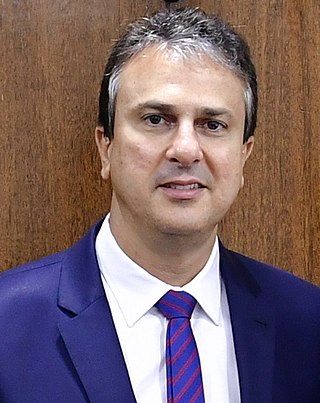
The 2018 Ceará state election was held on October 7, 2018 as part of the general elections in Brazil. Those from Ceará eligible to vote elected their representatives in the following proportion: 22 federal deputies, 2 senators, and 46 state deputies.

Wilson José Witzel is a Brazilian politician and lawyer who was the 63rd Governor of the state of Rio de Janeiro. A member of the Social Christian Party, Witzel is a former federal judge and is an ex-marine. On 28 October 2018, he was elected Governor of the State of Rio de Janeiro with a four-year term beginning in January 2019, replacing Luiz Fernando Pezão, until his impeachment in April 2021.
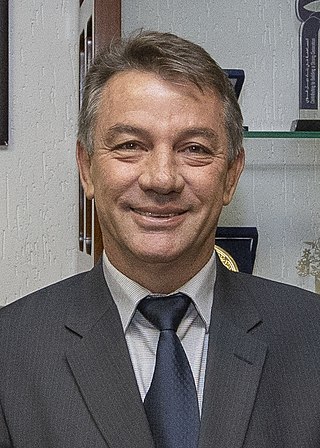
Antonio Oliverio García de Almeida is a Brazilian politician. He is the governor of the state of Roraima and member of the Progressive Party. A nationalist who opposes immigration, Denarium has advocated for closing Brazil's border with Venezuela in response to the Venezuelan refugee crisis. The inflow of migrants means that Roraima has a disproportionately higher Venezuelan Brazilian population compared to the rest of Brazil.

Municipal elections took place in Brazil on 15 November 2020. Electors chose Mayors, Vice-Mayors and City Councillors of all 5,568 cities of the country. The partisan conventions took place between 31 August and 16 September. They were the first elections since Bolsonaro's election as President.
Gubernatorial elections were held in Brazil on 2 October 2022 as part of the nationwide general elections to elect tickets with state governors and their vice governors. A second round was held on 30 October for states where no candidate was able to secure more than half of the votes in the first round.
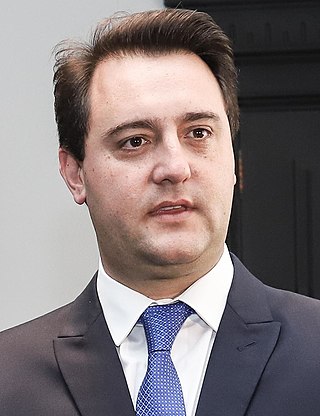
The 2022 Paraná state election took place in the state of Paraná, Brazil on 2 October 2022. Voters elected a Governor, Vice Governor, one Senator, 30 representatives for the Chamber of Deputies, and 54 Legislative Assembly members. The incumbent Governor, Ratinho Júnior, of the Social Democratic Party (PSD), was reelected in the first round with 69.64% of the votes.

The electoral system of Brazil is the set of means used to choose representatives and government members of the Federative Republic of Brazil. The current system is defined by the 1988 Constitution and the Electoral Code, in addition to being regulated by the Superior Electoral Court as delegated by law. The Constitution itself already defines three distinct electoral systems, which are detailed in the Electoral Code: proportional elections for the Chamber of Deputies, mirrored in the legislative powers at the state and municipal levels, majority elections with one or two elected representatives to the Federal Senate and majority elections in two rounds for president and other executive heads in other spheres.

The 2022 Espírito Santo gubernatorial election occurred on 2 October 2022 and elected the Governor and Vice Governor of the state and members for the 30 seats of the Legislative Assembly.

Romildo Magalhães da Silva was a Brazilian politician who briefly served as the governor of the state of Acre from 1991 to 1992. He was initially the vice-governor, but was elevated to the post after the assassination of then-governor Edmundo Pinto. Magalhães was succeeded by Orleir Cameli. Prior to entering state politics, he was the mayor of the city of Feijó from 1978 to 1982, and later served again from 1997 to 2000. Magalhães would later be imprisoned on corruption charges due to illegal usage of public coffers and administrative impropriety.















